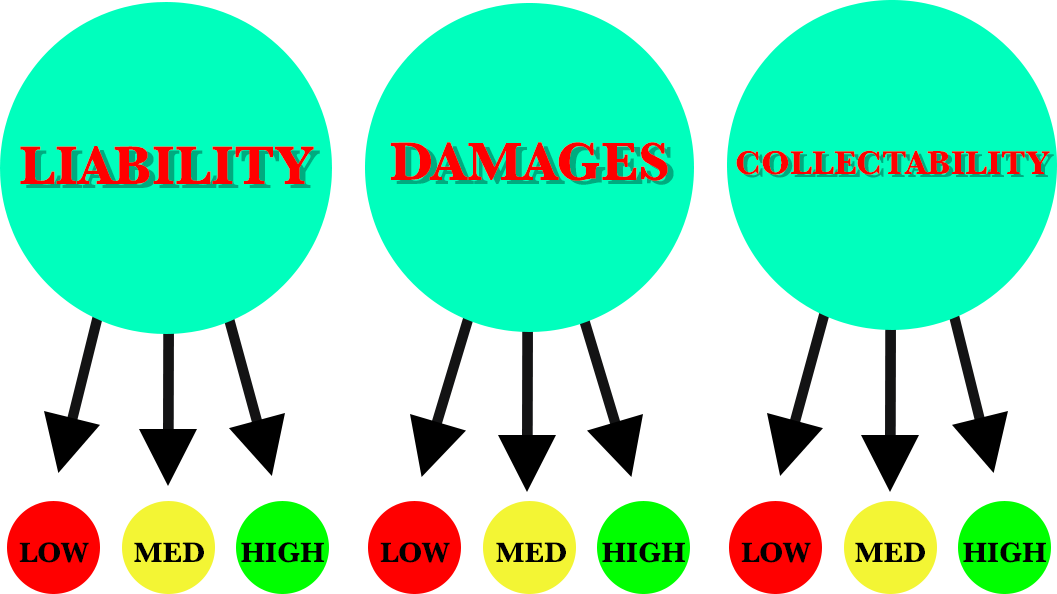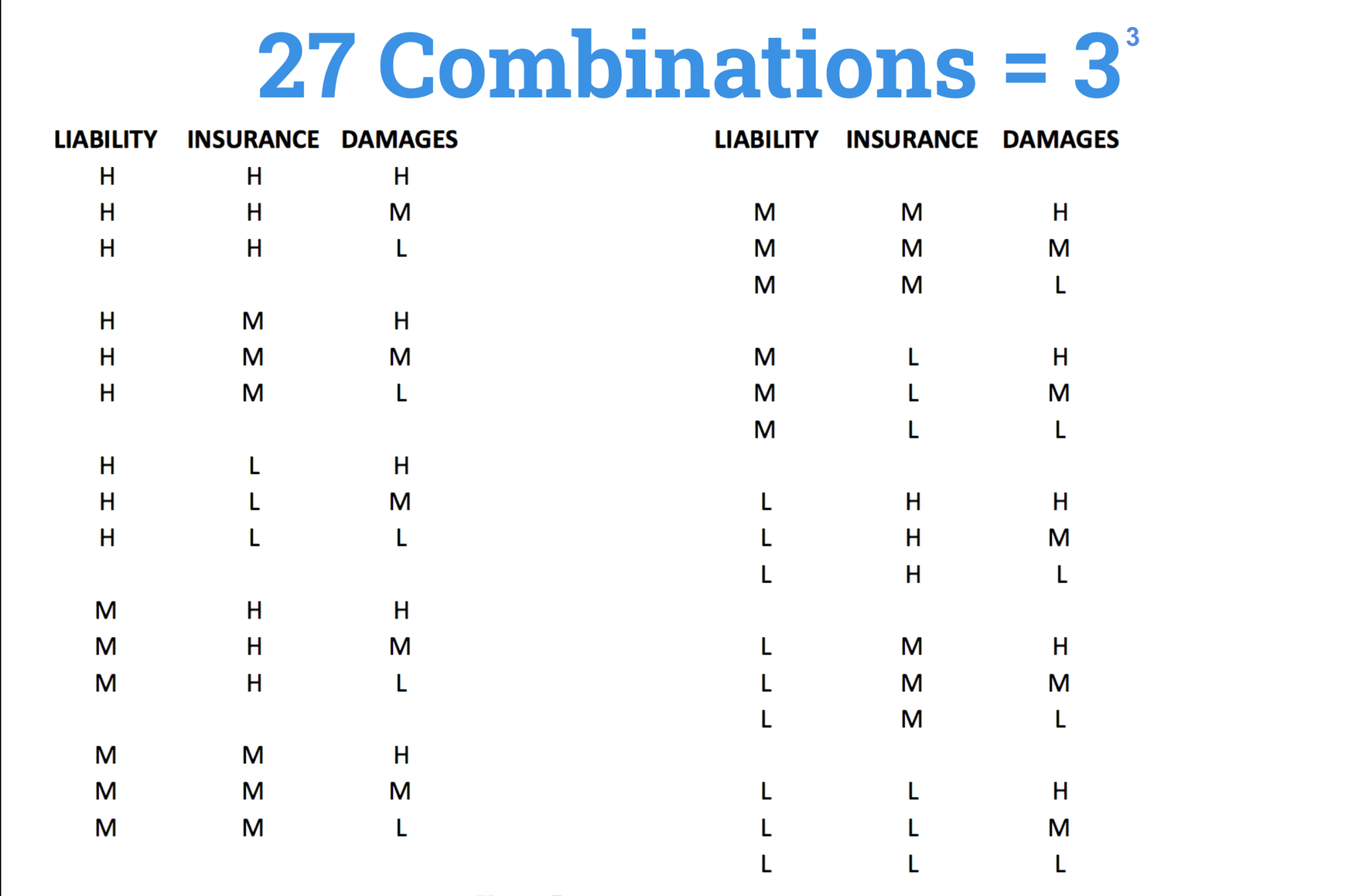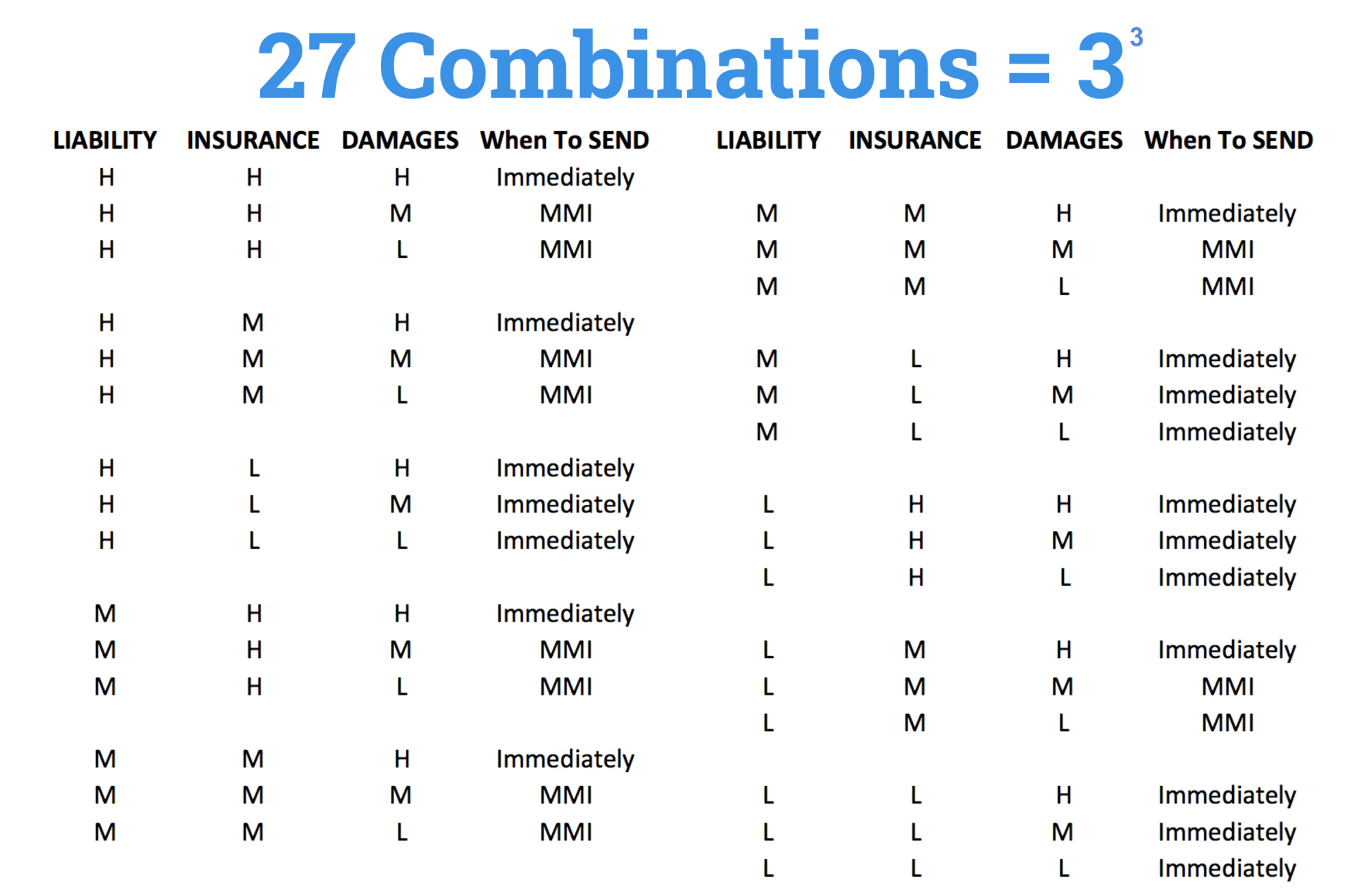How Long Should My Car Accident Case Take
When Should My Car Accident Injury Case Be Over
How long will it take to get my case over and me paid?
Many attorneys and law firms make one common mistake when handling a car accident injury case. They wait too long to try and settle your case.
Timing is everything in our lives, and the proper timing of when your case should be settled is a very serious matter.
Most attorneys will tell you that all clients should wait 6 months to reach their Maximum Medical Improvement (MMI) before talking to any insurance company about settlement. In many cases, this is bad advice, and a waste of time, and it costs their clients dearly at the time of settlement.
Read this page and learn how and when a settlement offer should be made in your car accident case.
And if you have questions and would like a free consultation about your specific personal injury matter, please call me at 813-222-2222.
I hope you find a lot of value in this guide to car accidents.
Thanks for your time.
Matt Powell, Esq.

Contents
#21 WHEN SHOULD A SETTLEMENT OFFER BE MADE IN MY CAR ACCIDENT CASE?
Why Some Cases Should NOT WAIT
#22 WHEN MATTLAW™ SUGGESTS SENDING THE SETTLEMENT LETTER QUICKLY
#23 WHEN DOES A LAWSUIT NEED TO BE FILED FOR MY CASE
What I Need To Know About Filing A Law Suit For My Car Accident Case
#24 RISKS OF GOING ALL THE WAY TO TRIAL
#21 WHEN SHOULD A SETTLEMENT OFFER BE MADE IN MY CAR ACCIDENT CASE?
How Long Should My Car Accident Injury Case Take
Timing is everything in your car accident case. Knowing when to make a settlement demand has a few variables that most lawyers don’t even consider. Sadly, some lawyers tell their clients that a meaningful demand letter can’t be made until you reach MMI, or 6 months after treatment. This is not always good advice. And here is why:
Why a Board Certified Lawyer will increase the value of your car accident injury settlement
There is special value in hiring an experienced, skilled, Board Certified Civil Trial Lawyer, such as Matt Powell. I have taught other lawyers Continuing Legal Education classes to attorneys about how they can use my legal systems to maximize our client’s recovery while minimizing the time it takes to obtain a full and fair recovery.

When you hire MattLaw™, we will tell you which combination of liability, damages and collectability your case has out of the 27 combinations.
More than half of the combinations cause us to send a settlement letter out on your behalf as quickly as possible, and not to wait for 6 months after your treatment is done.
What are the combinations:

Assuming that there is some liability or fault, some damages, and some collectability, there are only 27 possible combinations 33
Out of the possible 27 combinations 17 of them require making an early demand for settlement.

You may ask, why not wait until your doctor’s release you from treatment before making a demand?
Because in a situation where the insurance policy limits are low, and there are some damages, why wait?
If we wait, your medical bills will keep going up, and this reduces the amount of money you will collect from the total policy limits.
And if the insurance company won’t pay you their policy limits, then we want to file suit right away, because if the Bodily Injury Insurance Company won’t pay you the policy limits, there is nothing to be gained by waiting.
And when the insurance company won’t pay their insurance policy limits, the insurance company may be in Bad Faith for failing to pay a claim when they could have paid, and they should have paid their insurance policy limits to you.
You see, Insurance companies owe a duty to protect their insured.
This duty is to get a signed release from any claimant, so their customer, the insured, is not sued and made to pay MORE than their insurance policy limits.
When MattLaw™ suggests waiting until you reach Maximum Medical Improvement (MMI) on some cases:
There are 10 of the 27 situations where we suggest waiting for you to reach MMI before sending a settlement offer letter.
These are the situations where the damages are not fully known, and there is likely more than enough insurance coverage to pay the full value of your claim. And it would be reckless to offer to settle your claim until your doctors have told you about all of your injuries caused by the car accident and how your injuries will affect you in the future.
And in these situations, we ask our clients to follow their doctors recommendations and treat until you reach MMI.
And then, and only then, are we able to make a reasonable settlement offer on your behalf. And if the insurance company won’t pay you fairly, then we will speak with you and decide if you want us to file suit for you.
THE EXCEPTIONS that cause us to FILE SUIT IMMEDIATELY:
There are a few circumstances in which we will file suit much faster and they are:
- If our client is a child, and the insurance policy limits are $50,000.00 or more, then we file suit immediately.
- Why file suit faster for a child?
- The courts want to supervise a settlement if a child is part of the claim. And since you need court approval, why not start that process immediately.
- The at fault driver committed a crime:
- DUI driving under the influence
- Leaving the scene of the crash / Fleeing
- Reckless Driving
- If our client is elderly and in poor health
- Our client needs the money while they can enjoy it
- If the at fault driver is elderly
- We want to get the case started before the at fault driver might pass away
- If our client died as a result of the car crash
- If there are three or more possible injured people causing a race for small policy limits.
#23 WHEN DOES A LAWSUIT NEED TO BE FILED FOR MY CASE
Going To Court When The Insurance Company Refuses To Pay
WHEN DOES A LAWSUIT NEED TO BE FILED FOR YOU?
WHO DECIDES WHEN TO FILE SUIT FOR MY DAMAGES?
The short answer is, you, the client, decide if and when we have to file a lawsuit on your behalf.
MattLaw™ will give you our advice, we will explain the reasons why we think filing a lawsuit is in your best interests.
We will also explain to you what the risks are of filing a lawsuit
What the benefits are of filing a lawsuit:
- Let a Jury decide the value of your case, not an insurance company
- When the damages are catastrophic
- When the insurance company is acting in Bad Faith
What are the risks of filing a lawsuit:
- If you go all the way to a judgment (your case never settled along the way) and you lose, the defendant is entitled to their court costs
- If you go all the way to a judgment and you lost, you might be responsible for some of the defendant’s attorney fees
If a lawsuit is filed on your behalf a settlement may arise at any time during the litigation, or even in the middle of a trial.

What happens when the at fault insurance company denies fault?
In some cases, the insurance company tells us they won’t pay because they think their insured was not at fault.
When this happens and we believe our client’s version of the crash is accurate and the other driver is at fault, I suggest letting MattLaw™ file suit,
because waiting won’t help at all.
Why wait until the doctors have reached their final conclusions to find out the insurance company won’t pay.
I suggest we file suit earlier and let the lawyers and witnesses figure out fault while you are still treating your car accident injuries.
#24 RISKS OF GOING ALL THE WAY TO TRIAL
Most Cases Never Get To Trial
WHAT ARE THE RISKS AND BENEFITS OF GOING ALL THE WAY TO TRIAL
The decision to file suit should never be taken lightly. Trying a case certainly has risks involved.
Your decision to settle your case rests with you. MattLaw™ gives advice about when and how to settle your case, but you have the final decision.
You, the client, have the final word, the final say in whether to fight on, or take any settlement offer. It is our job to counsel and advise you whether we think the offer is fair or not, whether there are reasons to reject the offer, or whether to consider other reasons to accept a settlement offer. Our job is to guide you through this process. We have decades of experience and a deep understanding of the issues that you face. So, before we file suit, we have a serious talk. Our job is to explain the pros and cons of a lawsuit, and possibly trial. Our job is to answer your questions so you feel comfortable in your decision.

The biggest risk of a trial usually is that an injured person can lose because of a few things. First, they can lose because the jury finds that the defendant was not at fault. When we can’t prove liability, you have a loss. That is why the liability aspect of your case is so important. That is why collecting evidence regarding the fault of the wrongdoer is so important. The second biggest reason why an injured person loses at trial is the concept of “CAUSATION.” Causation is a very common defense to any case. The insurance lawyer and their hired doctors say the following:
Well, first, it is not our fault (liability).
Second, they will say “well, if it is our fault, you were not injured.
Or, well, if it is our fault and you were injured, you were injured from something before this car accident, and not by our insured.
Or, if it is our fault and you are injured, you must have been injured AFTER the car crash.
Or, well, you can’t be hurt too bad, because you waited x amount of days to go to the doctor.
Or, well, you are not hurt too badly because you missed x amount of doctor appointments, and if you were really hurt, you would not have missed one appointment.
Or, well, you went to every doctor appointment because you are over treating and you should not follow your doctor’s advice.
The other common defense facing a plaintiff is that your injuries are all “subjective” and there is nothing “objective” to prove you were hurt, and since you are seeking money, you are motivated to lie for money and say you have subjective pain that can’t be proven. And your doctors are all idiots because they believe you and your doctor’s objective findings should not be believed. Etc., etc.
So, how do we deal with these defenses?
It is so important that you select doctors who are able to write good reports that help a jury understand the nature of your injuries, and the cause of them. Keeping up your doctors appointments is also very important. Everyone can understand a person missing one or two medical appointments, but please tell your doctor why you missed an appointment, so your doctor will document your absence with a good reason why you missed your appointment.
What happens if you flat out lose the trial? If this were to happen, you can be held responsible for the court costs spent by the defense. These costs are things like the witness fees they paid for their experts to come to court. Deposition and Court Reporter fees. These can add up. But you need to know about them as a potential risk.
Another risk is, you may win your case, but not a lot. And when you get a win but not enough money, your risk is that you won’t recover any money due to attorney fees, costs, and medical bills.
In some cases we will send a Proposal For Settlement to the defense, and if they don’t accept our proposal and we go to trial and recover 25% more than the offer, then the Court may award you attorney fees on top of your recovery. Well the same goes the other way as well. The defense may send you a proposal for settlement, and if we recover a judgment that is less than 75% of their offer, you may be looking at a judgment against you for the attorney fees incurred by the defense from the date they made the offer. These risks are real, but you and your attorney must discuss these issues and make sure you are comfortable with your case, and your attorney’s ability to successfully try your case.
Things that can be done to minimize risk in your trial are:
Collect the right evidence.
Follow your doctor’s advice.
Don’t do anything that is offensive that a jury will not like that might be seen on social media.
Call good witnesses to trial who are credible to support you and your case.
The benefits of a Jury Trial are you get your day in court.
In most bad faith situations, you must either go all the way to trial, or abandon the value of your case that is above the policy limits. This is because the at fault insurance company rarely admits their bad faith, and instead sees the chances of them paying Bad Faith money as low, because they can oftentimes wear out the Plaintiff, and settle the case within the policy limits.
When Should My Case Be Over, and if it does not settle what are the risks of trial?
The bottom line is your case may be one of the 17 types of Car Accident Injury Cases that should have a demand letter sent out in the first 45 days.
If your type of case requires you to reach Maximum Medical Improvement (MMI) after six months of treatment first, then your case may take longer.
What happens after we make a full and fair settlement offer? If the insurance company agrees and your case is settled, then it will be over quickly, as quick as 60 days.
If the Insurance Company Adjuster treats your case unfairly, then we decide if you want MattLaw™ to file suit, and seek full and fair compensation?
The risks of a bad outcome from a jury trial are very low because 99% of all cases get resolved before a Judgment is ever entered in your case.
If you are being treated unfairly by the insurance company, then the insurance company may be in Bad Faith, and if this happens, your case may take a much longer time. It may require two jury trials before you finally get paid.
If you have questions or would like a free consultation, please pick up your phone call call us at MattLaw™. 813-222-2222
Sincerely,
Matt Powell, Esq.
Board Certified Civil Trial Lawyer by the Florida Bar

